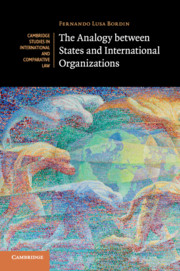Book contents
- The Analogy between States and International Organizations
- Cambridge Studies in International and Comparative Law: 138
- The Analogy between States and International Organizations
- Copyright page
- Dedication
- Contents
- Foreword
- Acknowledgements
- Table of Cases
- Select Table of Key Documents
- List of Abbreviations
- Introduction
- Part I The Case for an Analogy
- Part II Objections to the Analogy
- 3 Structural Differences between States and International Organizations
- 4 International Organizations as ‘Special Subjects’
- 5 International Organizations as ‘Layered Subjects’
- Part III Limits of the Analogy
- Conclusion
- Bibliography
- Index
- Cambridge Studies in International and Comparative Law
5 - International Organizations as ‘Layered Subjects’
from Part II - Objections to the Analogy
Published online by Cambridge University Press: 09 November 2018
- The Analogy between States and International Organizations
- Cambridge Studies in International and Comparative Law: 138
- The Analogy between States and International Organizations
- Copyright page
- Dedication
- Contents
- Foreword
- Acknowledgements
- Table of Cases
- Select Table of Key Documents
- List of Abbreviations
- Introduction
- Part I The Case for an Analogy
- Part II Objections to the Analogy
- 3 Structural Differences between States and International Organizations
- 4 International Organizations as ‘Special Subjects’
- 5 International Organizations as ‘Layered Subjects’
- Part III Limits of the Analogy
- Conclusion
- Bibliography
- Index
- Cambridge Studies in International and Comparative Law
Summary
- Type
- Chapter
- Information
- The Analogy between States and International Organizations , pp. 147 - 184Publisher: Cambridge University PressPrint publication year: 2018



